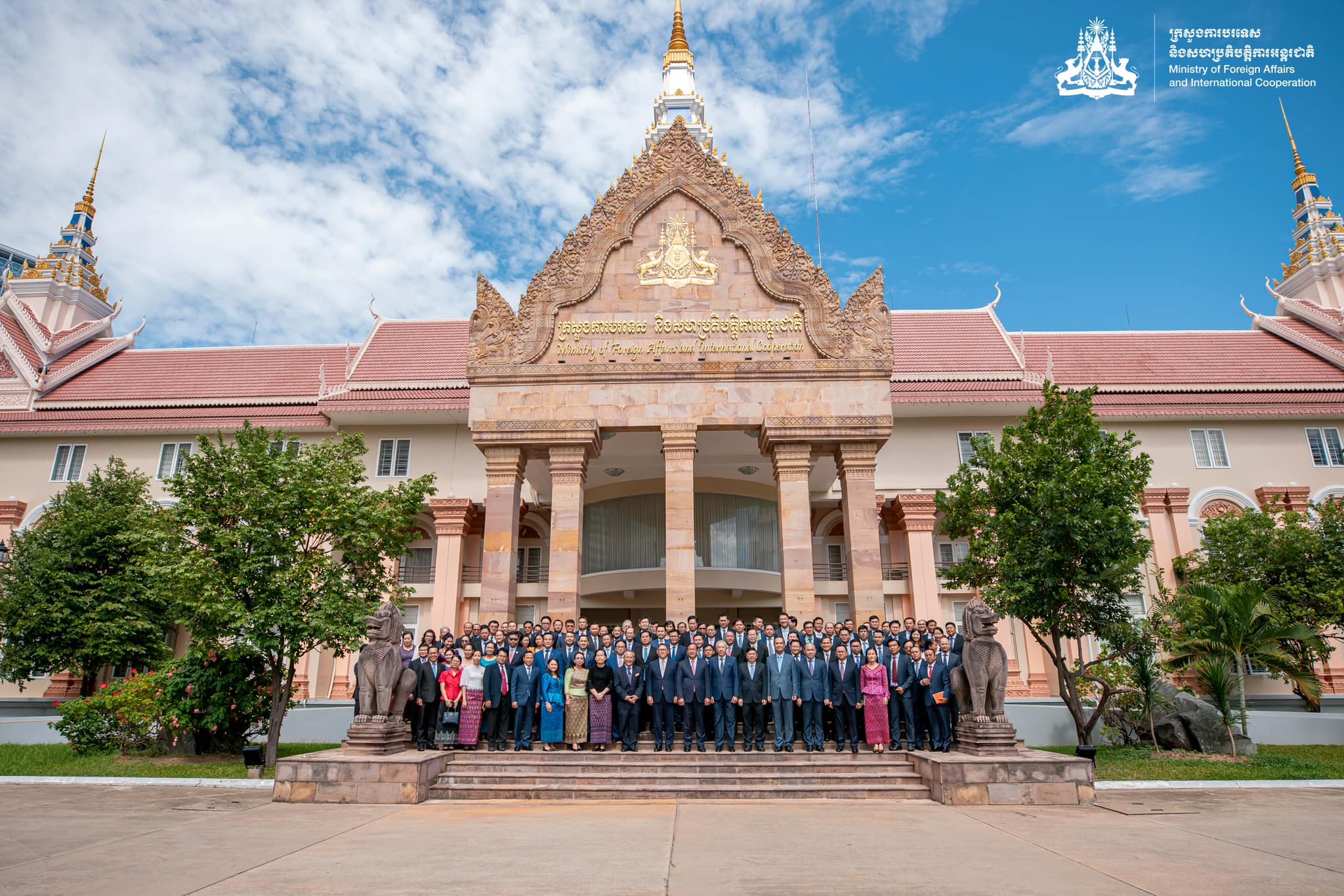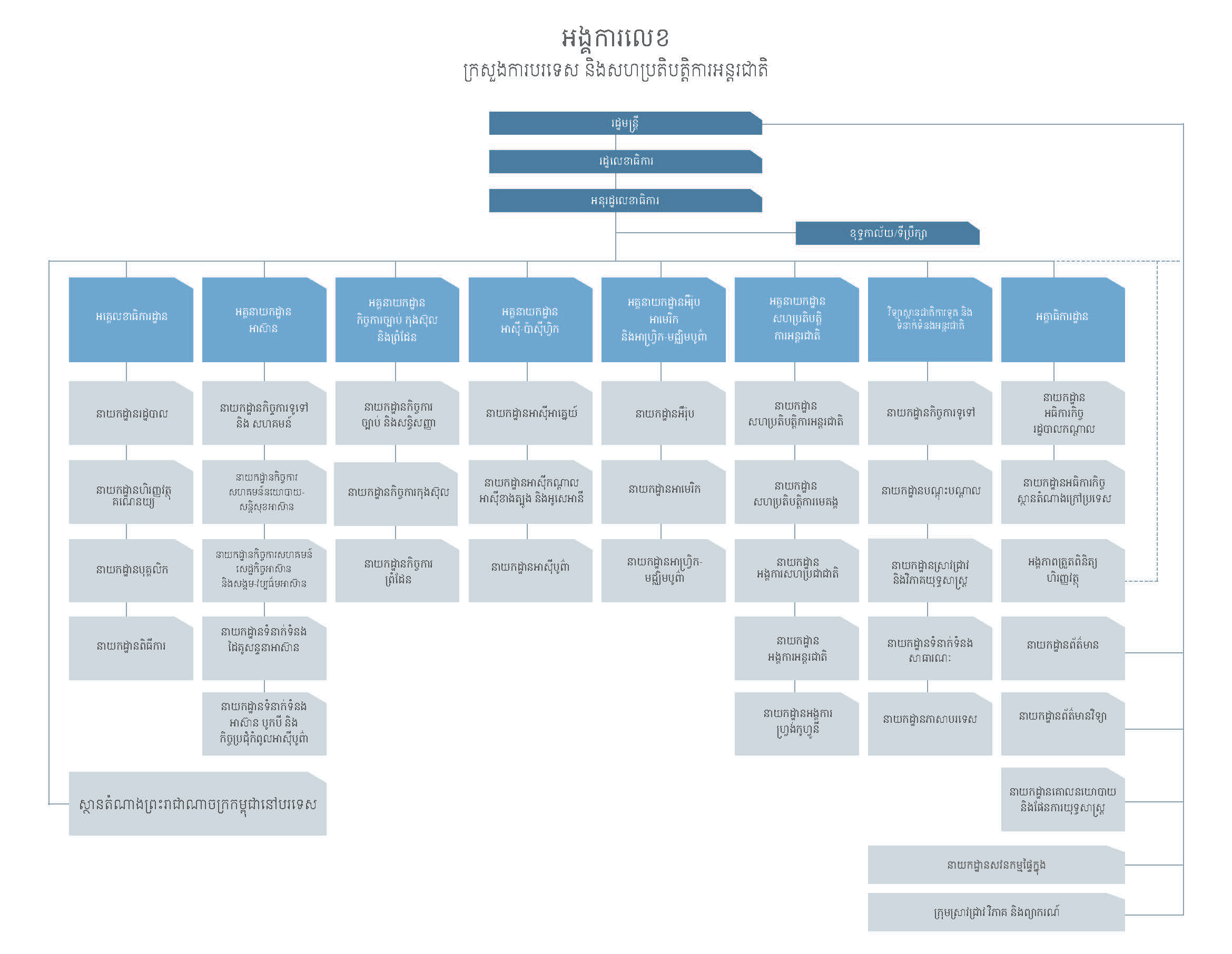
ក្រសួងការបរទេស និងសហប្រតិបត្តិការអន្តរជាតិ។ រូបថតពី គេហទំព័រហ្វេសប៊ុក របស់ក្រសួង ថតនៅថ្ងៃទី២៣ ខែសីហា ឆ្នាំ២០២៣។
ការបង្កើតទ្បើង
យោងតាមព្រះរាជក្រឹត្យលេខ នស/រកម/០១៩៦/១០ ក្រសួងការបរទេស និងសហប្រតិបត្តិការអន្តរជាតិ (MFAIC) ត្រូវបានបង្កើតឡើងជាផ្លូវការនៅថ្ងៃទី២៤ ខែមករា ឆ្នាំ១៩៩៦។ ក្រសួងមានទំនួលខុសត្រូវសំខាន់ៗចំនួន ១៧ រួមមាន ការពារឯករាជ្យ អធិបតេយ្យភាព បូរណភាពទឹកដី សេចក្តីថ្លៃថ្នូរ និងកិត្យានុភាពនៃព្រះរាជាណាចក្រកម្ពុជា អនុវត្តគោលនយោបាយការបរទេសរបស់កម្ពុជា ពង្រឹងទំនាក់ទំនងកម្ពុជាជាមួយសហគមន៍អន្តរជាតិ និងតំណាងឱ្យកម្ពុជាទ្វេភាគី និងកិច្ចសន្ទនា និងកិច្ចសហប្រតិបត្តិការពហុភាគី។1 អានបន្ថែមនៅមាត្រា ៥ នៃអនុក្រឹត្យលេខ ២៧៤ អនក្រ.បក។
គោលនយោបាយការបរទេសរបស់កម្ពុជា ផ្អែកទៅលើបេសកកម្មយុទ្ធសាស្ត្រចំនួន ៥ គឺ ១) ការពារឯករាជ្យ អធិបតេយ្យភាពជាតិ បូរណភាពទឹកដី អព្យាក្រឹតភាព រក្សាការពារឱ្យបានគត់មត់នូវសន្តិភាព សន្តិសុខ ស្ថិរភាព សណ្តាប់ធ្នាប់ និងឯកភាពសង្គម ២)បង្កើនមិត្តខាងក្រៅ ដោយឈរលើស្មារតីឯករាជ្យជាតិ ៣) ជំរុញការងារការទូតសេដ្ឋកិច្ច ៤) បន្តគាំទ្រ និងពង្រឹងពហុភាគីនិយម និង ៥) លើកកម្ពស់គុណភាព ប្រសិទ្ធភាពការងារ និងការអភិវឌ្ឍសមត្ថភាពមន្ត្រីការទូត។2
គិតត្រឹមឆ្នាំ២០២៣ ក្រសួងការបរទេស និងសហប្រតិបត្តិការអន្តរជាតិស្ថិតនៅក្រោមការដឹកនាំរបស់ឯកឧត្តម សុខ ចិន្តាសោភា ឧបនាយករដ្ឋមន្ត្រី និងជារដ្ឋមន្ត្រីក្រសួងការបរទេស និងសហប្រតិបត្តិការអន្តរជាតិ។ នៅក្រោមរដ្ឋមន្ត្រីគឺរដ្ឋលេខាធិការ ១៩រូប អនុរដ្ឋលេខាធិការ ១៧រូប និងអគ្គនាយក ៩រូប។3 បន្ថែមពីលើតំណែងរបស់ លោកនៅក្នុងក្រសួងការបរទេស និងសហប្រតិបត្តិការអន្តរជាតិ ឯកឧត្តម សុខ ចិន្តាសោភាក្នុងរដ្ឋាភិបាលនីតិកាលទី០៧ បានជាប់ឆ្នោតជ្រើសរើសដំណាងរាស្ត្រជាសមាជិកសភា ប្រចាំមណ្ឌលខេត្តកណ្តាល។4
រចនាសម្ព័ន្ធអង្គការ

រចនាសម្ព័ន្ធអង្គការរបស់ក្រសួងការបរទេស និងសហប្រតិបត្តិការអន្តរជាតិ. ដកស្រង់ចេញពីគេហទំព័រផ្លូវការរបស់ក្រសួងការបរទេស និងសហប្រតិបត្តិការអន្តរជាតិ។
រដ្ឋមន្ត្រីក្រសួងការបរទេសតាំងពីឆ្នាំ១៩៩៣
តារាងពេលវេលាខាងក្រោមបង្ហាញពីបញ្ជីឈ្មោះបុគ្គលដែលធ្លាប់បានបម្រើការជារដ្ឋមន្ត្រីក្រសួងការបរទេស និងសហប្រតិបត្តិការអន្តរជាតិតាំងពីឆ្នាំ ១៩៩៣។5 6 7 8 9 10

តារាងពេលវេលាបង្ហាញពីអាណត្តិរដ្ឋមន្ត្រីក្រសួងការបរទេស និងទំនាក់ទំនងអន្តរជាតិ តាំងពីឆ្នាំ១៩៩៣ រៀបចំដោយក្រុមការងារ អូឌីស៊ី។
វិទ្យាស្ថានជាតិការទូត និងទំនាក់ទំនងអន្តរជាតិ
យោងតាមអនុក្រឹត្យលេខ ២៧៤ អនក្រ.បក ចុះថ្ងៃទី២៦ ខែធ្នូ ឆ្នាំ២០១៦ ដោយរាជរដ្ឋាភិបាលកម្ពុជា វិទ្យាស្ថានជាតិការទូត និងទំនាក់ទំនងអន្តរជាតិ (NIDIR) ត្រូវបានបង្កើតឡើងជាផ្លូវការ ក្រោមរដ្ឋមន្ត្រីក្រសួងការបរទេស និងសហប្រតិបត្តិការអន្តរជាតិ។ វិទ្យាស្ថាននេះមានបេសកកម្ម កសាងវិជ្ជាជីវៈអ្នកការទូតកម្ពុជា តាមរយៈការអភិវឌ្ឍសមត្ថភាព ដើម្បីបំពាក់ឱ្យពួកគេនូវជំនាញក្នុងវិស័យការទូត និងលើកកម្ពស់អធិបតេយ្យភាព និងតួនាទីរបស់កម្ពុជាក្នុងកិច្ចការតំបន់ និងអន្តរជាតិ។ ចក្ខុវិស័យចម្បងរបស់វិទ្យាស្ថានគឺដើម្បីក្លាយជាមជ្ឈមណ្ឌលឧត្តមភាពរបស់កម្ពុជាសម្រាប់ការបណ្តុះបណ្តាល ការទូត និងជាស្ថាប័នស្រាវជ្រាវកំពូលក្នុងវិស័យកិច្ចការអន្តរជាតិ។11
វិទ្យាស្ថាននេះមានភារកិច្ចសំខាន់ៗចំនួនបួន រួមមាន ១) បង្កើតកម្មវិធីបណ្តុះបណ្តាល និងស្រាវជ្រាវលើកិច្ចការបរទេស និងកិច្ចសហប្រតិបត្តិការអន្តរជាតិ ២) ផ្តល់ការបណ្តុះបណ្តាលជាភាសាបរទេស ៣) ធ្វើការស្រាវជ្រាវដើម្បីជូនដំណឹងអំពីគោលនយោបាយការបរទេស និងកិច្ចសហប្រតិបត្តិការអន្តរជាតិ និង ៤) បង្កើតភាពជាដៃគូជាមួយ ស្ថាប័នការទូត និងទំនាក់ទំនងអន្តរជាតិនានា។ នាយកដ្ឋានសំខាន់ៗចំនួនប្រាំដែលបង្កើតឡើងក្នុងនោះរួមមាន៖ នាយកដ្ឋានកិច្ចការទូទៅ នាយកដ្ឋានបណ្តុះបណ្តាល នាយកដ្ឋានស្រាវជ្រាវ និងវិភាគយុទ្ធសាស្ត្រ នាយកដ្ឋានទំនាក់ទំនងសាធារណៈ និងនាយកដ្ឋានភាសាបរទេស។12
នៅឆ្នាំ២០២០ វិទ្យាស្ថានជាតិការទូត និងទំនាក់ទំនងអន្តរជាតិបានចុះហត្ថលេខាលើអនុស្សរណៈយោគយល់គ្នា(MOU) ជាមួយមូលនិធិអាស៊ីស្តីពីកិច្ចសហប្រតិបត្តិការ និងការកសាងសមត្ថភាពលើការទូត និងទំនាក់ទំនងអន្តរជាតិ។ គោលដៅនៃអនុស្សរណៈនេះ គឺដើម្បីពង្រឹង ជំរុញ និងអភិវឌ្ឍកិច្ចសហប្រតិបត្តិការលើវិស័យទំនាក់ទំនងអន្តរជាតិ និងការទូត ព្រមទាំងគាំទ្រដល់កិច្ចខិតខំប្រឹងប្រែងរបស់រដ្ឋាភិបាលក្នុងការលើកកម្ពស់ទំនាក់ទំនងរបស់កម្ពុជាជាមួយសហគមន៍អន្តរជាតិ។13
កិច្ចសហប្រតិបត្តិការក្នុងតំបន់ និងអន្តរជាតិ
គិតត្រឹមឆ្នាំ២០២៣ អង្គការមិនមែនរដ្ឋាភិបាលបរទេសប្រហែល ២៨៨ បានចុះហត្ថលេខាលើអនុស្សរណៈនៃការយោគយល់គ្នា (MoU) ជាមួយក្រសួង។ អង្គការមិនមែនរដ្ឋាភិបាលមានប្រភពមកប្រទេសបីច្រើនជាងគេ រួមមានសហរដ្ឋអាមេរិក (៩៧ អង្គការ) កូរ៉េខាងត្បូង (៤១ អង្គការ) និង ជប៉ុន (២៨ អង្គការ)។ អង្គការមិនមែនរដ្ឋាភិបាលភាគច្រើនអនុវត្តគម្រោងទាក់ទងនឹងការអប់រំ សង្គមកិច្ច និងកសិកម្ម រួមជាមួយវិស័យអភិវឌ្ឍន៍ពាក់ព័ន្ធផ្សេងទៀត។14
កិច្ចសហប្រតិបត្តិការអន្តរជាតិផ្សេងទៀតរួមមាន អង្គការសហប្រជាជាតិ សមាគមប្រជាជាតិអាស៊ីអាគ្នេយ៍ (អាស៊ាន) គំនិតផ្តួចផ្តើមខ្សែក្រវាត់ និងផ្លូវ ក្របខណ្ឌកិច្ចសហប្រតិបត្តិការមេគង្គ ហ្វ្រង់កូហ្វូនី ACD/CICA/ASEM និង CLV/CLMV/ACMECS ជាដើម។15
ការទូតសេដ្ឋកិច្ចកម្ពុជា
ក្នុងនាមជាបេសកកម្មយុទ្ធសាស្ត្រមួយក្នុងចំណោមបេសកកម្មយុទ្ធសាស្ត្រទាំងប្រាំដែលបានរៀបរាប់ខាងលើ ការទូតសេដ្ឋកិច្ច គឺជាអាទិភាពចម្បងមួយរបស់ក្រសួង។ រាជរដ្ឋាភិបាលកម្ពុជា មានចក្ខុវិស័យប្រែក្លាយប្រទេសកម្ពុជាទៅជាប្រទេសដែលមានចំណូលមធ្យមកម្រិតខ្ពស់នៅឆ្នាំ២០៣០ និងជាប្រទេសមានចំណូលខ្ពស់នៅឆ្នាំ២០៥០ ដោយជំរុញឱ្យវិស័យការទូតឱ្យផ្តោតលើសេដ្ឋកិច្ច វប្បធម៌ និងទេសចរណ៍។ គោលដៅសំខាន់គឺដើម្បីទាក់ទាញការវិនិយោគបរទេស ធ្វើពិពិធកម្មប្រភពវិនិយោគ ពង្រីកទីផ្សារនាំចេញផលិតផលក្នុងស្រុក ទាក់ទាញភ្ញៀវទេសចរ និងផ្សព្វផ្សាយវប្បធម៌កម្ពុជាទៅកាន់ពិភពលោក។16
ក្រសួងការបរទេស និងសហប្រតិបត្តិការអន្តរជាតិបានដើរតួនាទីយ៉ាងសំខាន់ក្នុងការសម្រេចបាននូវការអនុវត្តរបស់កម្ពុជានូវ សេរីភាវូបនីយកម្មសេដ្ឋកិច្ច ពាណិជ្ជកម្មបើកចំហ និងសកលភាវូបនីយកម្ម ខណៈលើកកម្ពស់ពាណិជ្ជកម្មពហុភាគី ជាមួយអង្គការពាណិជ្ជកម្មពិភពលោក (WTO)។ ក្រសួងបានរួមចំណែកយ៉ាងសំខាន់ដល់ការចរចានៃកិច្ចព្រមព្រៀងពាណិជ្ជកម្មសេរី ដូចជាភាពជាដៃគូសេដ្ឋកិច្ចទូលំទូលាយ ក្នុងតំបន់ (RCEP) ក៏ដូចជាជាមួយនឹងទីផ្សារផ្សេងៗគ្នា រួមមានសាធារណរដ្ឋកូរ៉េ និងសហភាពសេដ្ឋកិច្ចអឺរ៉ាស៊ី។17 18
នៅឆ្នាំ២០២០ ក្រសួងការបរទេស និងសហប្រតិបត្តិការអន្តរជាតិបានអនុម័តយុទ្ធសាស្ត្រការទូតសេដ្ឋកិច្ច ២០២១-២០២៣ ដើម្បីបន្តសមាហរណកម្មសេដ្ឋកិច្ចរបស់កម្ពុជាទៅកាន់តំបន់ និងពិភពលោក តាមរយៈការពង្រឹងកិច្ចសហប្រតិបត្តិការទ្វេភាគី និងពហុភាគី ពិពិធកម្មប្រភពនៃកំណើន ពង្រីកសក្តានុពលសេដ្ឋកិច្ច និងទាញយកអត្ថប្រយោជន៍ពេញលេញនៃឱកាសថ្មីៗ។ យុទ្ធសាស្ត្រការទូតសេដ្ឋកិច្ចរបស់កម្ពុជាផ្តោតលើការការពារ និងការលើកកម្ពស់ផលប្រយោជន៍ជាតិក្នុងកម្រិតតំបន់ និងអន្តរជាតិ ដោយធានាបាននូវវិបុលភាពសេដ្ឋកិច្ច និងការអភិវឌ្ឍន៍សង្គម។19
លើសពីនេះ ក្រសួងក៏កំពុងប្រើប្រាស់ “ការទូតអាហារ” ដោយវាទាក់ទងទៅនឹងអាទិភាពទី៤ នៃក្របខ័ណ្ឌយុទ្ធសាស្ត្រ ការទូតសេដ្ឋកិច្ច ដែលនិយាយអំពីការលើកកម្ពស់វិស័យទេសចរណ៍ វប្បធម៌ និងកីឡា តាមរយៈការផ្សព្វផ្សាយប្រពៃណី វប្បធម៌ និងអាហារូបត្ថម្ភរបស់កម្ពុជា។20 នៅឆ្នាំ២០២២ ក្រសួងបានរៀបចំវគ្គបណ្តុះបណ្តាលស្តីពី “ការទូតម្ហូបអាហារ” សម្រាប់ឯកអគ្គរាជទូត និងចុងភៅដែលត្រូវបានតែងតាំងថ្មីនៅស្ថានទូតកម្ពុជានៅបរទេស ដោយសង្កត់ធ្ងន់លើរបៀបដែល ការទូតម្ហូបអាហារអាចផ្តល់ផលប្រយោជន៍ដល់ប្រទេសកម្ពុជានៅលើឆាកអន្តរជាតិ។21 ក្នុងឆ្នាំដដែលនេះ ក្រសួងក៏បានសម្ភោធ សៀវភៅ “កេរដំណែលស្នាដៃម្ហូបខ្មែរ“ ដើម្បីលើកកម្ពស់ការទូតផ្នែកធ្វើម្ហូប ដោយប្រើប្រាស់នូវមុខម្ហូប និងបង្អែមខ្មែរ។ ឯកឧត្តម ប្រាក់ សាខុន រដ្ឋមន្ត្រីក្រសួងការបរទេស និងសហប្រតិបត្តិការអន្តរជាតិ បានមានប្រសាសន៍ថា ការទូតអាហារមានឥទ្ធិពលអាចលើកកម្ពស់ពាណិជ្ជកម្ម ទេសចរណ៍វប្បធម៌ និងការនាំចេញរបស់កម្ពុជា។22
ទាក់ទងក្រសួងការបរទេស និងសហប្រតិបត្តិការអន្តរជាតិ
ឯកសារយោង
- 1. រាជរដ្ឋាភិបាលកម្ពុជា, “អនុក្រឹត្យលេខ ២៧៤ ស្តីពីការរៀបចំ និងការប្រព្រឹត្តទៅរបស់ក្រសួងការបរទេស និងសហប្រតិបត្តិការអន្តរជាតិ,” បានចូលអាននៅថ្ងៃទី២៩ ខែកញ្ញា ឆ្នាំ២០២៣។
- 2. ក្រសួងការបរទេស និងសហប្រតិបត្តិការអន្តរជាតិ, “ទិសដៅនយោបាយការបរទេសរបស់កម្ពុជា,” បានចូលអាននៅថ្ងៃទី២ ខែតុលា ឆ្នាំ២០២៣។
- 3. ក្រសួងការបរទេស និងសហប្រតិបត្តិការអន្តរជាតិ, “អង្គការលេខ,” បានចូលអាននៅថ្ងៃទី២ ខែតុលា ឆ្នាំ២០២៣។
- 4. ទីស្តីការគណៈរដ្ឋមន្ត្រី, “បញ្ជីរាយនាមបេក្ខជនជាប់ឆ្នោតជាតំណាងរាស្ត្រ នីតិកាលទី០៧ ឆ្នាំ២០២៣ [ជាភាសាខ្មែរ] តាមមណ្ឌលបោះឆ្នោត,” ចូលអាននៅថ្ងៃទី២០ ខែតុលា ឆ្នាំ២០២៣។
- 5. ក្រុមប្រឹក្សាធម្មនុញ្ញកម្ពុជា, “ក្រុមប្រឹក្សាធម្មនុញ្ញកម្ពុជា,” បានចូលអាននៅថ្ងៃទី១៩ ខែតុលា ឆ្នាំ២០២៣។
- 6. បុគ្គលិកភ្នំពេញប៉ុស្តិ៍, “អ៊ឹង ហួត – ការកើនឡើងកេរ្តិ៍ឈ្មោះដោយមិនបានគ្រោងទុក,” ១៩៩៥, បានចូលអាននៅថ្ងៃទី២០ ខែតុលា ឆ្នាំ២០២៣។
- 7. Leang, Delux, “លោក អ៊ឹង ហួត៖ ពីនាយករដ្ឋមន្ត្រី ក្លាយជាអ្នកដាំម្រេច,” ThmeyThmey, ឆ្នាំ២០១៥, បានចូលអាននៅថ្ងៃទី២០ ខែតុលា ឆ្នាំ២០២៣។
- 8. ក្រសួងការបរទេស និងសហប្រតិបត្តិការអន្តរជាតិ, “ប្រវត្តិរូបសង្ខេប,” ថ្ងៃទី១៦ ខែកក្កដា ឆ្នាំ២០១១, បានចូលអាននៅថ្ងៃទី២០ ខែតុលា ឆ្នាំ២០២៣។
- 9. ក្រសួងការបរទេស និងសហប្រតិបត្តិការអន្តរជាតិ, “ប្រវត្តិរូបសង្ខេប,” ២០១៨, បានចូលអាននៅថ្ងៃទី២០ ខែតុលា ឆ្នាំ២០២៣។
- 10. ក្រសួងការបរទេស និងសហប្រតិបត្តិការអន្តរជាតិ, “ប្រវត្តិរូបសង្ខេប,” បានចូលអាននៅថ្ងៃទី១៩ ខែតុលា ឆ្នាំ២០២៣។
- 11. NIDIR. “វិទ្យាស្ថានជាតិការទូត និងទំនាក់ទំនងអន្តរជាតិ,” បានចូលអាននៅថ្ងៃទី២៨ ខែកញ្ញា ឆ្នាំ២០២៣។
- 12. ដូចឯកសារយោងខាងដើម។
- 13. Tien, Kylie, “វិទ្យាស្ថានជាតិការទូត និងទំនាក់ទំនងអន្តរជាតិរបស់កម្ពុជា និងមូលនិធិអាស៊ី ចុះអនុស្សរណៈនៃការយោគយល់”, មូលនិធិអាស៊ី, ថ្ងៃទី២ ខែកក្កដា ឆ្នាំ២០២០, បានចូលអាននៅថ្ងៃទី២៨ ខែកញ្ញា ឆ្នាំ២០២៣។
- 14. ក្រសួងការបរទេស និងសហប្រតិបត្តិការអន្តរជាតិ, “បញ្ជីឈ្មោះអង្គការមិនមែនរដ្ឋាភិបាលបរទេសដែលបានចុះ អនុស្សរណៈយោគយល់គ្នា ជាមួយក្រសួងការបរទេស និងសហប្រតិបត្តិការអន្តរជាតិ,” បានចូលអាននៅថ្ងៃទី២ ខែតុលា ឆ្នាំ២០២៣។
- 15. ក្រសួងការបរទេស និងសហប្រតិបត្តិការអន្តរជាតិ, “ទំព័រដើម” ចូលអាននៅថ្ងៃទី២ ខែតុលា ឆ្នាំ២០២៣។
- 16. ក្រសួងការបរទេស និងសហប្រតិបត្តិការអន្តរជាតិ, “គោលនយោបាយការបរទេសរបស់កម្ពុជា,” បានចូលអាននៅថ្ងៃទី២ ខែតុលា ឆ្នាំ២០២៣។
- 17. ក្រសួងការបរទេស និងសហប្រតិបត្តិការអន្តរជាតិ, “ការទូតសេដ្ឋកិច្ច,” បានចូលអាននៅថ្ងៃទី១០ ខែតុលា ឆ្នាំ២០២៣។
- 18. ក្រសួងការបរទេស និងសហប្រតិបត្តិការអន្តរជាតិ, “យុទ្ធសាស្ត្រការទូតសេដ្ឋកិច្ច ២០២១-២០២៣,” ២០២១, បានចូលអាននៅថ្ងៃទី១០ ខែតុលា ឆ្នាំ២០២៣។
- 19. ដូចឯកសារយោងខាងដើម។
- 20. ដូចឯកសារយោងខាងដើម។
- 21. ក្រសួងការបរទេស និងសហប្រតិបត្តិការអន្តរជាតិ, “វគ្គបណ្តុះបណ្តាលស្តីពី ការទូតអាហារ,” ២០២២, បានចូលអាននៅថ្ងៃទី១០ ខែតុលា ឆ្នាំ២០២៣។
- 22. ជា វណ្ណយុទ្ធ, “ការទូតអាហារជាគន្លឹះដើម្បីជំរុញពាណិជ្ជកម្ម ទេសចរណ៍ ការនាំចេញ,” ខ្មែរថាមស៍, ថ្ងៃទី២៧ ខែមេសា ឆ្នាំ២០២៣, បានចូលអាននៅថ្ងៃទី១០ ខែតុលា ឆ្នាំ២០២៣។

